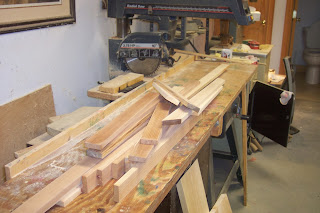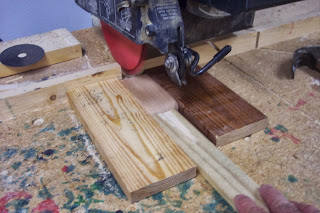Some time ago, classic fly tyer Eunan Hendron asked me to make some display stands for him that would hold a clear plastic baseball card holder, which held the fly. Made a few and shipped them off. Recently had some time on my hands, some wood cut-offs from various project, and the ever-present need to try and make a few bucks. Thus, this post on making (and hopefully selling!) a fly display stand with case.
First, there was that pesky pile of various woods, chief among them some 200-year old Longleaf pine that came down courtesy Hurricane Hugo in South Carolina back in 1989. I found it in the rafters of an old sawmill, and used it for the floors of a house we were building outside of Edgefield, SC, when I was the director of development for the National Wild Turkey Federation. The sapwood is light and has a nice color; the heartwood is hard as a rock, full of pine resin and almost impossible to sand because of that resin. But it is beautiful. So I started with this: (don't forget to click on the pic for the large image)
The first step in the process was to use the planer to get all the pieces down to the same thickness:
Fortunately it was a nice day, so I could move that operation outside:
Because it makes quite a mess (looking down at it over my obnoxious beer belly)!
Next, its on to the joiner to get one side perfectly straight:
Then on to the table saw to rip each piece into a standard width:
Back to the planer to remove any rough saw marks:
Now the strips are ready for a light sanding before they hit the radial arm saw to be cut to length:
Tucker stands guard over this top-secret project! No chipmunk dare approach!
On to the radial arm saw:
I make a mark on the outfeed side of the table that I use rather than measure and mark each piece after each cut:
A bunch of wanna-be display stands ready for milling:
On to the router table (wish I had room for a bigger, better one!)
Using a round-over bit to cut the radius on each end:
Someday I'm going to get a real belt/disc sander on a stand, but I made this do the job to take off any router burns (also a great way to file your fingernails...whether you want to or not):
Back to the radial arm saw and a stacked dado head cutter to make the groove for the plastic display case. The nice thing about the stacked head cutter is its ability to cut almost any width groove you can dream up. And if you're smart (I'm not), you write down which various cutters and spaces you used to cut a given width channel.
A simple jig out of scrap wood centers each piece the same, and keeps your fingers attached to your hands.
Further to that business about keeping fingers attached to hands, I use a stick to keep the workpiece where its supposed to be and my hand at a safe distance from those little carbide devils waiting to make a meal of my digits:
Voila'!
And a batch ready for finishing:
Pleasant weather made finishing easier; I seem to be the only person in the house that enjoys the smell of polyurethane! And its thirsty, thirsty work.
My favorite finish (wish they'd cut me a deal on the stuff!)
I stained a batch of the white pine blocks with English Chestnut; a nice, rich hue.
And those pieces head outdoors for their finish coats ( I spray each piece twice, then sand with 220 grit paper to knock the finish down a little, then spray on a third coat for a blemish-free finish):
The finished products:
Rear left is one of my Deep Green Beauties on a English Chestnut-stained pine block. Rear center is one of Kevin Branch's Orange Picasses on a Cherry base, and rear right is one of Eunan Hendron's Wild Irishman on the 200-year old longleaf heartpine base. Front left is unsanded white pine, and front right is the longleaf pine sapwood stand.
Want one??? Or some??? (ten percent discount for 5 or more):
As you've seen, these are made by hand, no computer-assisted anything, right here in Vermont, U.S.A. If any of my Canadian friends would like one, I'll probably have to add a couple bucks to the cost to cover shipping. You get the base with its felt feet on, the clear plastic case, and the little button that keeps the fly where its supposed to be. Shipped USPS first class. Oh, and you supply the fly!
Email me at gary.tanner117@gmail.com if you'd like one or my sover.net address if you have it. Paypal works just fine.































Cracking work, those heartwood pine are the bees knees....
ReplyDeleteGlad you like 'em, Eunan. Next up, your display stand for the show.
ReplyDeleteoh yeah, i owe you a picture too for the other article....
ReplyDeleteBring it on, boss!
DeleteThis comment has been removed by a blog administrator.
ReplyDeleteNice Gary.
ReplyDeleteI may give you a bit of business
Thanks, Alan!
DeleteGreat tutorial and absolutely love the finished product!
ReplyDeleteGlad you liked it Cindy! Been having fun watching your adventures in the "Shady Lady", too!
DeleteVery nice Gary!
ReplyDeleteRick
Always good to hear from you, Rick! Thanks!
DeleteThose are very cool. Would you trade for materials? I would accept any that are slow sellers for you as I don't need fancy, I don't want the wood base prettier than my fly.
ReplyDeleteGlad you like 'em, Ron. I'll send you an email re: trade.
Delete